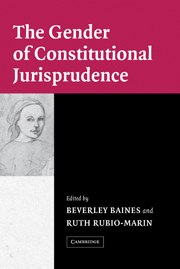Book contents
- Frontmatter
- Contents
- List of Contributors
- Acknowledgments
- The Gender of Constitutional Jurisprudence
- Introduction: Toward a Feminist Constitutional Agenda
- 1 Speaking into a Silence: Embedded Constitutionalism, the Australian Constitution, and the Rights of Women
- 2 Using the Canadian Charter of Rights and Freedoms to Constitute Women
- 3 Emancipatory Equality: Gender Jurisprudence under the Colombian Constitution
- 4 Gender Equality and International Human Rights in Costa Rican Constitutional Jurisprudence
- 5 Constituting Women: The French Ways
- 6 Gender in the German Constitution
- 7 India, Sex Equality, and Constitutional Law
- 8 Constitutional Transformation, Gender Equality, and Religious/National Conflict in Israel: Tentative Progress through the Obstacle Course
- 9 “No Nation Can Be Free When One Half of It Is Enslaved”: Constitutional Equality for Women in South Africa
- 10 Engendering the Constitution: The Spanish Experience
- 11 Gender Equality from a Constitutional Perspective: The Case of Turkey
- 12 Gender and the United States Constitution: Equal Protection, Privacy, and Federalism
- Index
- References
4 - Gender Equality and International Human Rights in Costa Rican Constitutional Jurisprudence
Published online by Cambridge University Press: 14 January 2010
- Frontmatter
- Contents
- List of Contributors
- Acknowledgments
- The Gender of Constitutional Jurisprudence
- Introduction: Toward a Feminist Constitutional Agenda
- 1 Speaking into a Silence: Embedded Constitutionalism, the Australian Constitution, and the Rights of Women
- 2 Using the Canadian Charter of Rights and Freedoms to Constitute Women
- 3 Emancipatory Equality: Gender Jurisprudence under the Colombian Constitution
- 4 Gender Equality and International Human Rights in Costa Rican Constitutional Jurisprudence
- 5 Constituting Women: The French Ways
- 6 Gender in the German Constitution
- 7 India, Sex Equality, and Constitutional Law
- 8 Constitutional Transformation, Gender Equality, and Religious/National Conflict in Israel: Tentative Progress through the Obstacle Course
- 9 “No Nation Can Be Free When One Half of It Is Enslaved”: Constitutional Equality for Women in South Africa
- 10 Engendering the Constitution: The Spanish Experience
- 11 Gender Equality from a Constitutional Perspective: The Case of Turkey
- 12 Gender and the United States Constitution: Equal Protection, Privacy, and Federalism
- Index
- References
Summary
On the farm “La Lucha” (The Struggle), in the central mountain range of Costa Rica, on March 12, 1948, José Figueres Ferrer took up arms against the government of Teodoro Picado. The Civil War had begun. This struggle shortly brought about dramatic changes in the constitutional order. On May 8, the victorious José Figueres, President of the Governing Junta, declared the Constitution of 1871 to be without force or effect (except for its chapters on social, national, and individual guarantees) and called a Constituent Assembly. Less than a year later, a new Constitution was approved, which made fundamental changes in the structure of government and the relationships between its inhabitants — changes that have had profound significance in the evolution of the country's long-standing constitutional acknowledgment of the equality of all Costa Ricans. This chapter will examine the 1949 Constitution, as amended, with respect to gender equality and Costa Rica's emerging constitutional gender jurisprudence, with particular emphasis on its incorporation of international human rights gender equality norms.
After gaining its independence from Spain in 1821, Costa Rica had seven prior Constitutions — adopted in 1821, 1844, 1847, 1848, 1859, 1869, and 1871. The country's post-independence legal system is a civil law system with its roots in French and Spanish codes. Whereas the Constitution separates the powers of government into the traditional three official branches — legislative, executive, and judicial, it also recognizes an independent Supreme Electoral Tribunal that has jurisdiction over disputes involving electoral matters and functions as a fourth power with the same rank as the other powers.
- Type
- Chapter
- Information
- The Gender of Constitutional Jurisprudence , pp. 99 - 121Publisher: Cambridge University PressPrint publication year: 2004

